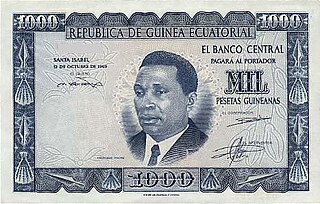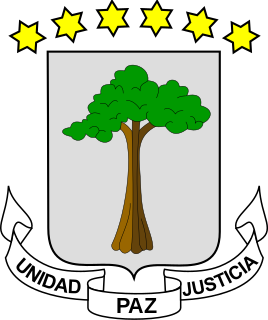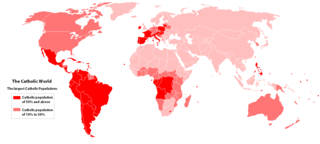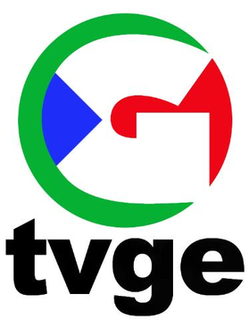
Equatorial Guinea is a small nation of 1.2 million located on the west coast of Central Africa which gained independence from Spain in 1968. Thanks to the discovery and exploitation of significant oil reserves in the 1990s, it enjoys a purchasing power parity GDP per capita of more than US$38,699 which is as of 2016 the highest in Africa and the 31st highest in the world. However, the country has been ranked only 138th out of 188 countries on the United Nations Human Development Index in 2015. After the oil price collapsed in 2014, the economy has gone into a free for all which has put growth in a downwards spiral from around 15% to −10%.
Telecommunications in Equatorial Guinea include radio, television, fixed and mobile telephones, and the Internet.

This article lists transport in Equatorial Guinea.

Equatorial Guinea is divided into two regions and eight provinces. The newest province is Djibloho, created in 2017 with its headquarters at Ciudad de la Paz, the country's future capital.

Convergence for Social Democracy is the only opposition party in Equatorial Guinea.

Bata Airport is an airport serving Bata in Litoral, Equatorial Guinea. It is the second largest airport in Equatorial Guinea after Malabo Airport.

The Catholic Church in Equatorial Guinea is part of the worldwide Catholic Church, under the spiritual leadership of the Pope in Rome.
Leandro Mbomio Nsue Edú-Aguong, born 5 January 1938, died 12 November 2012 (Malabo) at Evinayong, Spanish Guinea, is an Equatorial Guinean sculptor and artist, and former minister of Education and minister of information, tourism, art and culture.
The National University of Equatorial Guinea is a public institution of higher education, being one of the main universities of Equatorial Guinea in Central Africa.

A presidential election was held in Equatorial Guinea on November 29, 2009. Teodoro Obiang Nguema, who has been President of Equatorial Guinea since 1979, ran for another term and won re-election with 95.4% of the vote, according to official results. Opposition leader Plácido Micó Abogo placed second with 3.6%. However, international observers and the main opposition candidate questioned the legitimacy of this election, noting the poor management which created an unfriendly field for other candidates to take part, media manipulation and the unbalanced results.
Plácido Micó Abogo is an Equatoguinean politician. He has been the Secretary-General of the Convergence for Social Democracy (CPDS), an opposition political party in Equatorial Guinea, since 1994.
The 2008 Women's African Football Championship is of 15–29 November 2008 in Equatorial Guinea. The central African country is the first time host of the tournament. Eight national teams played in group matches and then against each other.

The 2015 Africa Cup of Nations, known as the Orange Africa Cup of Nations, Equatorial Guinea 2015 for sponsorship reasons, was the 30th staging of the Africa Cup of Nations, the international football championship of Africa. It was organized by the Confederation of African Football (CAF) and was held from 17 January to 8 February 2015.

Djibloho, officially the Administrative City of Djibloho, is the newest province of Equatorial Guinea, formally established by law in 2017. The administrative city was initially carved out of Añisok, a district in Wele-Nzas, on 1 August 2015, and was created to eventually replace Malabo as Equatorial Guinea's future national capital.

Equatorial Guinea–Spain relations refers to the diplomatic relations between Equatorial Guinea and Spain. Both nations are members of the Association of Academies of the Spanish Language, Organization of Ibero-American States and the United Nations.
Salvador Elá Nseng Abegue is an Equatorial Guinean military leader, politician, and diplomat.













